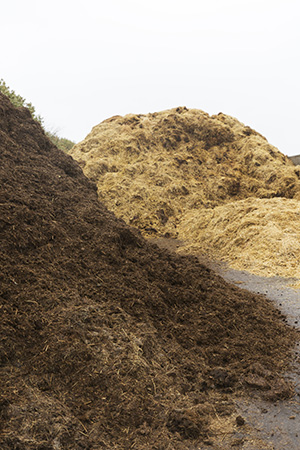New project to focus on plug-flow based acid fermentation
The project PASS-BIO will demonstrate potential benefits of using plug-flow reactors for anaerobic digestion, especially for acid (dark) fermentation and flexible feedstock utilization and nutrient recycling.

The utilization of biomass in bioprocesses is often limited to a few carbon sources, otherwise operators fear process instabilities or reduced yields. This drastically hinders the applicability of flexible and adopted feedstock utilization in many regions.
The research project PASS-BIO, funded within the frame of FACCE SURPLUS, aims to establish a suitable, cost-efficient bioreactor module for the flexible conversion of a wide variety of feedstock to produce either short-chain carboxylic acids or methane. The module follows a plug-flow principle.
- We know that acid (dark) fermentation can be used with any undefined feedstock mixtures, which are thus converted into building blocks of much higher value. Furthermore, acid fermentation can be performed very efficiently in plug-flow bioreactors. In our project, we aim to establish a fast screening method to identify optimal additives and pre-treatment of the feedstock in order to achieve an efficient hydrolysis and reduce the risk of failures, Project Coordinator, Dr. Stefan Junne from TU Berlin, Germany says.
This process is chosen as it is recognized as one of the most flexible, robust and easy-to-install processes, while reactors can be designed considerably cheaply.
Dr. Stefan Junne adds:
- There is evidence that a plug-flow reactor, in which process steps of anaerobic digestion are separated along the reactor, is a cheap and efficient alternative to the more common stirred tank reactors, where the different stages of anaerobic digestion typically cannot not be separated.
A true application scenario of a plug-flow digester
At first, parallel cultivation on microwell plates will be used to screen the ability of selected microorganisms for feedstock degredation, and the most suitable enzymatic cocktail is then used for further biomass valorization in lab and pilot scale. The operation of the acid fermentation (eventually coupled with methane production) is conducted together with a Finnish company and in a German ecovillage.
Furthermore, the project aims to develop an expert system, which will be able to guide the operator through the initial phase of operation, or in case of changes in feedstock composition and during process disturbances.
In the end, the partners will perform economic and ecologic evaluation of an up-scaled concept if the produced acids are coupled to single-cell oil production.
- The outcomes of the project will enable a true application scenario of a plug-flow digester to either produce methane or carboxylic acids from flexible feedstock. We hope to provide local and regional stakeholders with easy to implement monitoring strategies accompanied by an expert system, Dr. Stefan Junne says.
Further information
Partners in the 3-year PASS-BIO project include Technische Universität Berlin (TUB), Germany for lab and pilot scale process development, Natural Resources Institute Finland (Luke), Finland for scale up and Ecole Centrale de Lille (ECL)/Realcat, France for automated screening.
Contact
Dr.-Ing. Stefan Junne
Technische Universität Berlin (TUB), Germany
Email: stefan.junne@tu-berlin.de
